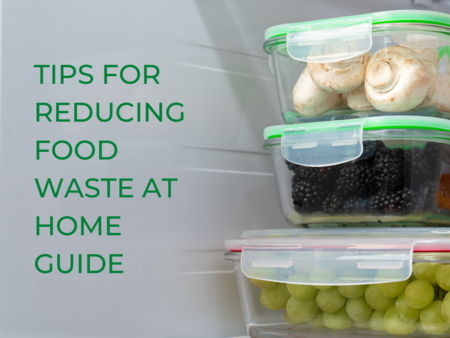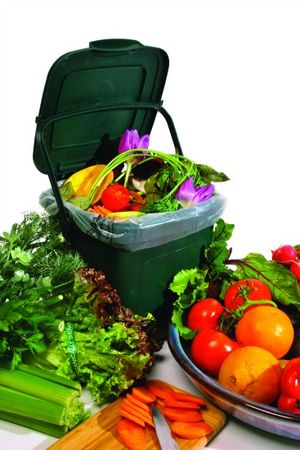
Food waste and food-soiled paper make up about 30% of a typical household’s waste. Whether you live in a home, condo, apartment or have a business, there are steps you can take to help reduce the amount of food waste sent to landfill.
Reduce first!
What's the best way to limit food waste sent to landfill? Make the most of the food you purchase!
Countless resources go into wasted food, including fossil fuels, land use, water and money. The average family of four in the U.S. spends $1,200 each year on food that is not eaten!
Check out this guide for tips and tricks to help you maximize the food you have at home, saving you time and money! It includes tips for:
- Turning leftover takeout into lunch
- Storing food to keep it fresh longer
- Meal planning to help you shop quickly for what you need
- Learning what food label dates actually mean, and when food really expires past use
Want more hands-on help? Watch out for our "Reduce Wasted Food" class in the Greener Living class series. New classes added every spring and fall.
Compost Right
Keeping valuable food waste and compostable paper out of the garbage provides great environmental and economic benefits.
- The raw material becomes rich, nutrient-filled compost that helps feed gardens around Bellevue.
- Compost added to gardens helps reduce water use - it slows runoff from sprinklers and rain.
- Compost can substitute for fertilizers, which are harmful to Bellevue's streams, lakes, and wetlands.
To get these great benefits, here's how to compost right.
Food in, plastic out
The best way to compost right is to put food and food-soiled paper in the compost bin and keep plastic out. Plastic bags, containers and packaging should never be put in the compost because they do not break down and can contaminate compost that people use on their lawns and gardens.
What to do with food containers?
- Scrape food out of containers and packaging and into the compost bin.
- Containers must be clean and dry before going in the recycling bin.
- Clean and dry plastic bags can only be recycled if you take them to a takeback location external link, otherwise put them in the garbage. If you can't empty and clean a container, then the whole thing goes in the garbage to avoid contaminating the compost and recycling bins.
What to compost
No matter if it's scraps or ends, moldy or rotten, food can always be composted. Food-soiled paper like pizza boxes can be composted, but cardboard boxes like those that come from a package delivery company should be recycled – just make sure you recycle right. Common compostable items include:
- Meat, fish, poultry, bones
- Dairy products (yogurt, cottage cheese, etc.)
- Vegetable and fruit trimmings
- Egg shells, bread, pasta and coffee grounds
- Paper towels and napkins
- Paper coffee filters
- Food-soiled cardboard like pizza boxes
- Non-shiny/uncoated food-soiled paper like napkins, paper towels, brown paper bags and paper plates
How to Compost Right
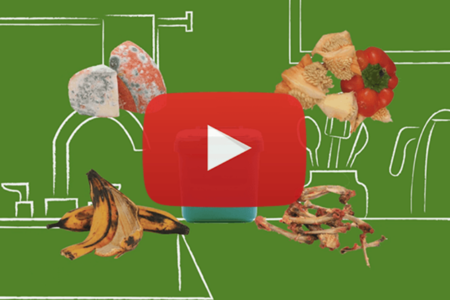
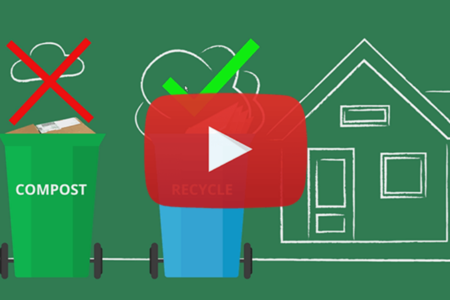
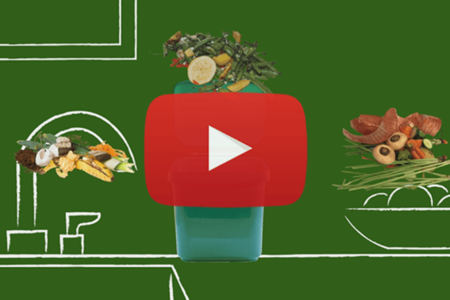
When in doubt, find out
It's important to put the right materials in your compost bin. If you're not sure if an item is compostable, check your Republic Services recycling guide. If you're still unsure, put it in the garbage to avoid contamination.
Get Started Composting
- Single-family home customers: Customers in single-family homes can get a free composter by calling Republic Services at 425-452-4762. Compost placed with yard waste in your green container is picked up weekly at no extra cost.
- Customers in apartments or condos, contact 425-452-6932 or recycle@bellevuewa.gov to find out if your community is signed up for compost collection service. Communities can receive up to 2 compost carts per garbage container, collected weekly at no extra cost. The City can provide a free small kitchen compost container for individual households.
- Explore in detail what you can recycle in your food and yard waste cart.
Tips to Keep Compost Mess-Free
- Bag it! Use a paper or approved compostable bag to store food scraps. Just toss the bag in your food and yard waste cart when it’s full. See places in Bellevue where you can purchase approved compostable bags.
- Use the news! Laying newspaper at the bottom of your cart or wrapping your scraps in newspaper helps keep your cart clean.
- Chill it! Put leftovers in a container or wrap them in paper, then place them in your refrigerator until your weekly collection day.
- Rinse your kitchen container and yard waste cart frequently into yard areas or sanitary sewer drains.
- Cover food scraps in your cart with food-soiled paper, shredded paper, or yard waste.
